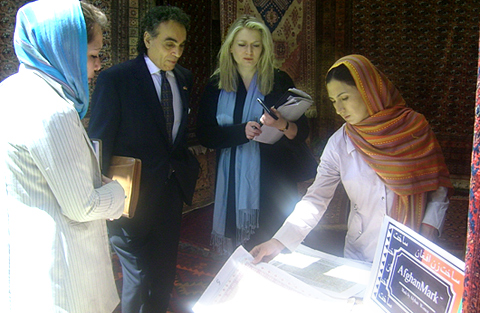© All Rights
Reserved


Local news / Delaware Valley, PA/NJ 
Revitalizing an industryBy MARION CALLAHANPhillyBurbs.com 11/11/2007 7:15:59 AM Ali Nejad routinely drives past the Bucks County Courthouse, where the displayed pictures of troops who died in Iraq and Afghanistan remind him of how issues plaguing war-torn countries across the globe matter here. "The military," he said, "plays one role in rebuilding Afghanistan." Nejad and his wife have found a way they can help too. Ali and Theresa Nejad have for two decades sold handmade rugs from around the world from their Doylestown store. They were among a special envoy of business owners who traveled with U.S. Department of Commerce officials to Afghanistan this summer to help resurrect the country's centuries-old carpet industry, a key element in its reconstruction. "I know war is a local issue as well," said Ali Nejad. "The military has one function. But the bottom line is stability comes from jobs and opportunity. And we have some expertise to help." Throughout history, Afghanistan has been a global leader in carpet production, which is among the country's top industries. When the Taliban took over, carpet makers fled to Pakistan. Though many are returning to their home-based professions, Afghan weavers lack the infrastructure to finish their products and sell them to an international market. From their store Nejad Gallery on Main Street, the couple talked of their four-day trip to Kabul, reflecting on the formidable challenges the industry faces. In Afghanistan, Theresa met with dozens of men and women, advising them on how to update their designs and colors to make their products more marketable. "Consider your business has stopped for 10 years: All workers are gone. Top designers left. Many colors they are using aren't marketable anymore," said Theresa, who continues to work with some of the business owners she met. Marketing the handmade rugs, however, is just one hurdle facing the Afghan carpet-makers. "Electricity is a big problem and so is transporting the rugs once they are woven," said Theresa, adding that the country is landlocked and lacks a secure means of exporting the rugs. "And it's scary. Security is a growing concern. Abductions are happening and the production of poppy (used to make heroin) has grown exponentially. So you have the criminal element controlling massive amounts of land and people." Susan Hamrock Mann, the Commerce Department's director of the Iraq and Afghanistan investment and reconstruction task force, said carpets represent one of Afghanistan's largest official exports to the world, including the United States. "And those exports to the United States continue to grow, according to the World Trade Atlas, from 2004 to 2006, there was a 60 percent increase in Afghanistan's knotted floor covering exports to the United States," said Mann, adding that exports of Afghan rugs to the United States rose by 38 percent during the first four months of 2007. According to the Afghanistan Carpet Exporters Guild, more than 1 million Afghans work in the production of carpets, with millions more working in compatible industries such as wool production, cutting/washing and design. "Afghanistan has a comparative advantage in the rug sector due to its combination of legacy and tradition, domestic wool, hand spinning and natural dyes," she said. "The need to modernize is great," she said. "For instance, despite the advantages of Afghanistan's carpet sector, it is not yet reaching its potential due to a lack of modern finishing facilities, financing for weavers, transportation services and supply of domestic wool." "Some have looms on the external parts of their homes and depend on sunlight for it to dry or simply for light to weave; you can function under these circumstances, but you can't be prosperous," said Theresa, adding that it could take up to six months to make one rug. Theresa said employment would grow and pride in the industry would build if Afghan carpet makers had the ability to finish their products at home. "Missing," Theresa said, "are local washing facilities and electricity to run them." Right now, Afghan rug-weavers have to send their rugs to Pakistan to be washed and finished. Once exported, about 90 percent are exported to foreign markets with labels that say, "Made in Pakistan." "The hard work and creative aspect is in the weaving; they want credit for their crafts," said Ali Nejad. "All they have is their hands; their weaving skills are in their hearts. But material, washing and wool have to come from another source. "These people want to stand on their own, not on the leash of Pakistan." "A washing facility has been promised," said Theresa, who has been in touch with U.S. Rep. Patrick Murphy's office and the Department of Commerce to see the project through. "Until many of these issues get addressed," Ali Nejad said, "the industry will not thrive. For now, he said, the Afghanistan carpet market is not the place to look for short-term financial rewards." "For someone to go there and expect to make money now is totally out of the question. It would be a huge loss," he said. The Nejads said their visit to Afghanistan was not a business investment. "There are much easier ways to do business elsewhere," said Nejad, who imports rugs from India, China and several other Asian countries. "You don't need to go to a place where you could be shot or kidnapped to find business. This effort is something we can do to help U.S. forces. We are civilians making sure the economic climate is also being addressed. People need jobs and opportunities - that is the light at the end of the tunnel."
|
